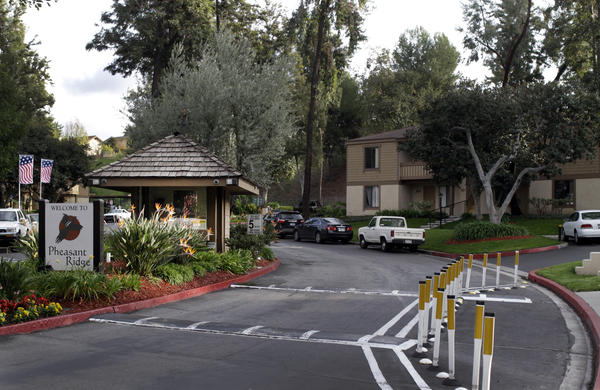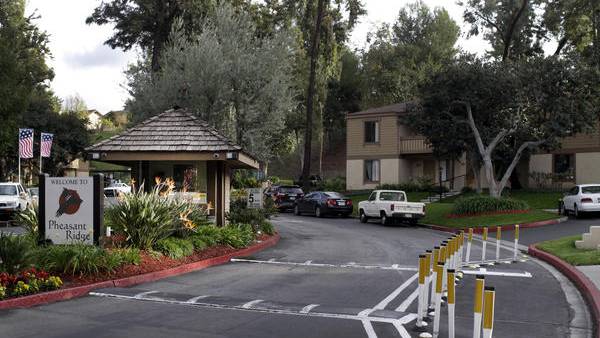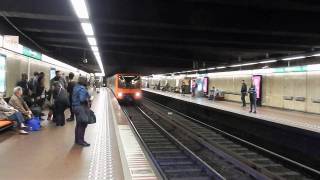Birth Tourism in America - 16 "maternity hotel" operating illegally in Los Angeles County
Source: articles.latimes.com

The entrance to Pheasant Ridge apartments in Rowland Heights, a "maternity hotel" where Chinese women come to give birth in order to gain U.S. citizenship for their babies. (Lawrence K. Ho / Los Angeles Times)
They are cited for illegally operating boardinghouses in residential zones, all in Rowland Heights or Hacienda Heights. Women from Asia give birth to U.S. citizen babies at the facilities.
Following a flurry of complaints, Los Angeles County inspectors have cited 16 "maternity hotel" owners for illegally operating boardinghouses in residential zones.
The facilities, all in Rowland Heights or Hacienda Heights, will ultimately be shut down, county officials said.
No major health or safety issues were found at the hotels, where women from Asia stay to give birth to U.S. citizen babies. Some were cited for building and fire code violations, according to a report released Thursday. Unauthorized renovations included kitchens, laundries, nurseries and living quarters for workers, the report said.
DOCUMENT: L.A. County report on "maternity hotels"
The multi-agency inspections were commissioned by the Board of Supervisors in February after media coverage of a Chino Hills maternity hotel triggered an increase in complaints. The women typically come from China or Taiwan, paying up to $20,000 to stay in the facilities for several months before and after giving birth. The baby receives a U.S. passport, and the family returns home to Asia.
So-called birth tourism is permitted under U.S. immigration law as long as the pregnant woman has a valid tourist or business visa. But maternity hotels in the San Gabriel Valley have often operated out of single-family homes in violation of local zoning laws. A draft ordinance targeting the hotels will probably not be ready until July at the earliest, said the report by L.A. County Chief Executive Officer William T Fujioka.
In the state Assembly, Curt Hagman (R-Chino Hills) has introduced a bill that would criminalize the operation of a hotel in a residential zone.
The hotels’ exteriors are generally well-kept, the report said. But some neighbors complain of frequent comings and goings. In the Chino Hills case, a hilltop mansion was allegedly converted into a maternity hotel with 17 bedrooms and 17 bathrooms, overloading the septic tank and resulting in a massive sewage spill.
A Mandarin-speaking investigator is accompanying the county inspection teams, resulting in better communication with hotel operators, the report said. Still, of 66 locations targeted for inspection, inspectors could gain access only to 42, 16 of which were deemed to be maternity hotels.
All of the inspections were triggered by complaints from residents. Word appears to have spread among hotel operators, who know to deny access or to assert that pregnant guests are family members, the report said.
Pheasant Ridge, a 600-unit apartment complex in Rowland Heights, where groups of pregnant women are a common sight, was singled out in the report. Inspectors found nurseries housing multiple babies, along with large-scale laundries and kitchens. But when inspectors returned, the apartments had been cleaned up. The maternity operations may have moved to different locations within the complex, the report said.
A spokeswoman for Pheasant Ridge said she could not comment.
Social workers from the Department of Children and Family Services did not find any signs of abuse or neglect among infants at the hotels. Nor was there any evidence of Medi-Cal fraud, the report said. But Supervisor Don Knabe, who has led the effort to shut down the hotels, said health issues and potential misuse of government benefits remain his primary concerns.
"The bigger issue is whether those facilities that are created inside a household are capable of taking care of a sick mother or a sick baby, who could then wind up in a county or state facility, and the taxpayers paying for that," Knabe said.
Betty Hung, policy director at the Asian Pacific American Legal Center, is concerned that Asian Americans might be unfairly singled out by neighbors as county officials move forward with stamping out the hotels.
"We continue to be concerned about the potential for racial profiling and anti-Chinese or anti-immigrant sentiment being a potential impetus for this really massive allocation of resources," Hung said.
Source: LA Times






















